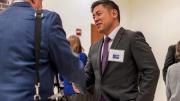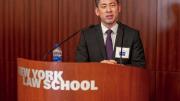A
s the United States struggles with unauthorized immigration, and the administration of President Donald J. Trump sharply constricts legal means of entry, such as appeals for asylum, political counter-forces have been mobilizing.
In New York City, the essence of multicultural America, few organizations are more fiercely focused on advancing immigrant rights than the New York Immigration Coalition (NYIC), directed by Steven Choi, J.D.’04. “We need to rebuild a new, expansive, forward-facing vision for what we think a strong immigration system should be,” he says, “engaging with presidential candidates, figuring out what leverage we can use to get them to align with us—all while responding to the continued distortion of an immigration system designed by white supremacist Stephen Miller and the Trump administration.”
The NYIC was instrumental in pushing for state legislative wins last year: the DREAM Act, granting undocumented students access to financial aid and scholarships for higher education, and the “Green Light Law,” allowing undocumented immigrants to obtain driver’s licenses. Choi also leads the New York Counts 2020 initiative, having obtained $60 million in city and state funding to reach communities that are traditionally undercounted in the census.
Those “bellwether” victories, he says, cleared the way for the NYIC’s 2020 priority, a statutory “right to counsel”—akin to the public defenders provided for Americans accused of serious crimes—for those facing deportation. Meanwhile, he has expanded NYIC’s political arm and is cementing policy commitments (as he did when endorsing Hillary Clinton in 2016) with candidates in the April 28 New York Democratic primary. The ultimate goal, according to Choi, is “to use New York as the tip of the spear for the rest of the country on immigration policy overall.”
Ideally, he wants a focus on a “robust path to citizenship, a reinforced family-based system that eliminates backlogs that keep some immigrants separated from their families for decades, and an end to the wasteful, inhumane, and cruel practices of our current ‘enforcement’ system.” He envisions an endorsement based on “a common, unified platform, with partners across the country making similar endorsements, so that we can speak with one voice.”
That’s a gargantuan task. But Choi’s been working up to it. Born in the United States, to Korean-immigrant parents, he grew up talking politics at the dinner table, and went on to work in public legal services and community organizing, primarily with Korean Americans, while studying history at Stanford. After earning a master’s in Korean studies from the University of Hawai‘i at Mānoa, he lived in Korea, “connecting with grassroots progressive and leftist movements there and spending a lot of time thinking about ideology,” before finding a place within the public-interest community at Harvard Law School (HLS).
In 2013, fresh from leading the major expansion of the Korean-American focused MinKwon Center for Community Action, in Queens, he was hired to head the far more diversified NYIC. Its members range from smaller, grassroots groups like South Bronx United and Mekong NYC to SEPA Mujer to mainstay social-service agencies, like Catholic Charities in New York and the Legal Aid Society. Within six years, Choi has built the NYIC into the largest, most diverse organization of its kind in the country—quintupling its annual budget to $10 million and increasing staff from 16 to 55.
Most significantly, he has opened new, permanent satellite offices in Long Island, Westchester County, Buffalo, and Syracuse, reaching and rallying rising immigrant hubs, including the most recently resettled refugees, from war-torn regions like Afghanistan, Myanmar, and the Democratic Republic of Congo. New York State is home to about 4.5 million immigrants (defined as foreign-born individuals), according to 2017 statistics published by the Migration Policy Institute: 23 percent of the state’s population (a 2.5 percent jump from 2000). In a continuing trend, more than a million live outside New York City.
That growing statewide base was critical in winning the 2019 driver’s license law, and disproved, from Choi’s perspective, the “traditional notion that immigrant issues are a political loser outside of” New York City. Twelve other states already offer licensing options; in New York, debate on the issue spanned 18 years, raising concerns across party lines, and was also used as a partisan wedge. A handful of clerks in Republican-held counties sued over the law (courts have so far upheld it) and some commentators railed against it. “What message are we sending?” asked Fox Nation host Tomi Lahren when the law took effect in December. “Come here illegally, remain here illegally, and instead of paying the consequences, our government will rubber-stamp your illegal activity and hand out perks, like driver’s licenses?”
Choi is undeterred. Everyone benefits when every driver on the road is certified and insured, he argues. “It also pumps millions of dollars into our economy and tax coffers by allowing maximum mobility for all members of our economy, workforce, and society.” Most importantly, he adds, it enables people “to take their kids to school or the doctor’s office, and attend places of worship free of the worry of arrest and potential deportation by doing these activities without a license.”
Such a volatile political climate, he argues, has at times required a more combative approach.
There are significant numbers of “persuadables,” Choi explains: people undecided on the licensing and other immigrant-rights issues. Much of the anti-immigration sentiment was fueled primarily by those county suits, he says. Such a volatile political climate, however, has at times required a more combative approach. “One thing that’s changed in the last couple of years,” he asserts, is that “now I have no qualms picking fights with anybody.” That includes challenging New York’s powerful Democratic governor, Andrew Cuomo, state legislators, and anyone else “not doing the right thing or engaging in immigrant hatred and demagoguery.”
Cuomo ran his 2018 re-election campaign on a heavily anti-Trump platform, holding his inaugural address on Ellis Island, touting his family’s own immigrant Italian roots. And Choi has dogged him to deliver. When Cuomo’s “Liberty Defense Project”—a public-private venture to help immigrants access legal services, regardless of document status—turned out, at the eleventh hour, to be only $1 million in foundation donations, Choi says, “We went on a scorched-earth campaign.” Eventually $10 million in public funds annually were earmarked for legal services, he says, “but at significant cost to our political relationship with Cuomo.”
Last summer, during the license campaign, it was reported that Cuomo’s office was undermining the effort, so Choi wrote a New York Daily News op-ed piece questioning Cuomo’s courage and comparing him, unfavorably, to his father, former legendary governor Mario Cuomo. “We were like, you know what?” Choi says. “There’s only one opportunity to do driver’s licenses. We’re going all out.”
Such adamancy derives in part, he says, from “growing up as a non-white racial minority and constantly feeling like I was not up to par, that I was overlooked.” His parents had graduated from a top South Korean medical school, but then spent nearly a decade gaining credentials through grueling hours as peripatetic medical residents in the United States before settling their family in Chappaqua, in Westchester County, in 1983. They were the only immigrants, and the only non-white residents, in their neighborhood. (That county is now 25 percent immigrant, Choi adds.)
During a 2016 interview for KoreanAmericanStory.org’s Legacy Project (viewable on YouTube), he described himself as a goofy-looking Asian kid with glasses who loved basketball, but was immediately discounted on the court because of his looks. “I just got used to having a chip on my shoulder,” he says in the video, laughing good-humoredly. But the points feel stark.
Elementary-school classmates would ask, “Are you American?”—and Choi didn’t know what to say. A friend finally declared that he was born in America, so he must be American, Choi remembers, “which seemed to settle the matter, at least for the moment. Little did I realize how complex the answer to that question would actually be.”
He grappled with that at Stanford, learning about colonialism and imperialism, and gravitated toward social justice. He joined student efforts to increase tenure rates for under-represented female and minority professors, and wrote his senior thesis on the case of the tenured Stanford professor H. Bruce Franklin, who was fired in 1972 on charges of inciting student disruptions.
By then, Choi was feeling relatively radicalized himself. While at the University of Hawai‘i at Mānoa, he interned during summers at community education centers in Los Angeles’s Koreatown and the predominantly Asian neighborhood of Flushing, Queens. After earning his master’s in 2000, he spent a year in Korea, then jumped from that heady experience straight into HLS, “where most of the students were preparing for lucrative careers in corporate law.” His response was to double down on studying civil and workers’ rights, and racial justice—around the same time the September 11 attacks would utterly redefine Americans’ global outlook and attitudes toward “otherness.”
Choi credits his student experiences at the Harvard Law School legal services center with providing a crash course in “real lawyering.”
Recalling his student experiences at the HLS legal services center (now the WilmerHale Legal Services Center of Harvard Law School), Choi credits the late clinical professor David Grossman ’79, M.T.S. ’83, J.D. ’88, and then clinical supervisor (now managing attorney) Maureen E. McDonagh for providing a crash course in “real lawyering.” He became so engrossed in the case of a Haitian immigrant family facing a tripling of its rent that he spent most of his final summer in Boston preparing for and arguing a housing-court trial, instead of focusing on studying for the bar—“which I barely passed as a result.” He also worked with the Asian outreach unit of Greater Boston Legal Services and, foreshadowing his current role, co-chaired the 2003 HLS National Asian Pacific American Conference on Law & Public Policy. While learning to raise money and organize complex events, “managing both egos and logistics at the same time,” he realized he was good at that work—and liked it.
In New York City after graduation, Choi directed the Korean Workers Project (part of the Asian American Legal Defense and Education Fund), serving as lead counsel on more than 25 state and federal lawsuits, and also developed a community-education campaign. In 2008, he became executive director of the MinKwon Center for Community Action, creating a city-wide Asian-American coalition focused on census and redistricting issues, and leading the charge during the U.S. Census 2010 count that resulted in four new Asian-majority state legislative districts and the first Asian-plurality congressional district in the state.
Today, Choi leads the intensive, grass-roots effort New York Counts 2020. Obstacles to an accurate count remain, he says, despite the Supreme Court’s ruling against the Trump administration’s effort (which the NYIC helped fight) to add a citizenship question to the census form. Widespread fear is making people reluctant to participate, he continues, especially as “the administration continues to use its tools and levers in the redistricting process—attempting to make sure that only citizens count in drawing political districts, instead of all people as the Constitution requires.”
The proposed legal-counsel legislation raises similar questions about fundamental rights. Losing an immigration case can be as dire as a prison sentence, he maintains—and expecting people to navigate the legal and bureaucratic systems on their own “is farcical.” As for children “trying to ‘represent’ themselves in court? It’s flat-out unconscionable.”
Choi also co-chairs the Fair Immigration Reform Movement (FIRM), which has spearheaded issues especially relevant to young people caught up in the crisis, like DACA and the Dream Act, and would love to see comprehensive immigration reforms. Ideally, on the federal level, he’d prioritize creating a cogent path to legalization for undocumented immigrants and an expedited method for clearing backlogged family visas. (Waiting so long to reunite, he says, is a major factor driving undocumented immigration.)
Beyond that, and probably most crucial to narrowing the political divisions over immigration policy, is the need for “a radical re-envisioning of what immigration enforcement means,” Choi adds. “The fact is that our system is gargantuan, bloated—filled with private prisons operating for huge profits with a force of agents—who see themselves as cops, and immigrants as ‘criminals,’” he continues, and “a court system where judges are…politicized instead of being part of the third branch and the separation of powers.”
Such fundamental reforms seemed at least possible in 2013, he points out, when the U.S. Senate passed a comprehensive reform bill, by a 68-32 vote margin, with 14 Republicans in favor. Some form of a bipartisan “grand bargain”—a citizenship path in exchange for more effective border and other enforcement—appeared viable. “Were we 100 percent behind the bill? No,” he says. “Did we feel it was important to move the comprehensive bill forward and get it passed? Absolutely. In hindsight, the fact that people on either side of the aisle were talking about a path to immigration reform…,” he trails off, then continues: “We would have been glad to engage in that dialogue and push that process forward. That was a substantive, and real, conversation.”
Now, he says, it’s highly unlikely, even with a Democratic president, that anything like those or other reforms discussed during the past two decades could be broached. But the truth is, “whether Donald Trump gets re-elected or not, the issue of how we treat immigrants—our fellow Americans and future citizens—is only going to get more important,” Choi argues. “Will we re-affirm that America is indeed a nation of immigrants? Or will we allow the Stephen Millers of the world to erase this from our collective history?”










